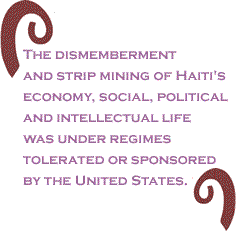
The following article
originally appeared in The
Jamaica Observer.
Just 11 months ago, in
his celebrated oration documenting the awesome details of Iraq's
weapons of mass destruction, US Secretary of State Colin Powell
made sure that he would not address the UN General Assembly against
the background of Picasso's Guernica – Picasso's
celebrated protest in paint against superpower terrorism. The mural
was hidden from sight on General Powell's orders, as he documented
the compelling reasons for a pre-emptive invasion of Iraq to keep
the world safe from terrorism.

Click
to view entire Two-Faced Colin Powell Cartoon
Guernica memorializes the attack by fascist German
and Italian dive-bombers against the Spanish town of Guernica,
an assault on the civilian population which helped doom the
legitimate, socialist government of Spain and introduce nearly
half a century of dictatorship.
The world considered the dive-bombing of Guernica an atrocity. Unfortunately
for us, the world did not know of another Guernica, in Haiti, nearly 20 years
earlier, when American dive bombers obliterated peasants, men and women armed
with machetes fighting for the freedom of their country.
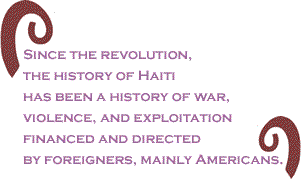
The Haitians are celebrating two centuries of freedom, two
centuries since their slave ancestors rose in revolt to throw
the French colonizers out of
Haiti. They had to do it twice, when Napoleon, newly installed in France,
tried to recapture the richest colony in the world for his country. The
Haitians threw out a British army too, but neither of these
extraordinary and heroic
feats is reflected in our history books.
Rah Rah
Haitian Musicians
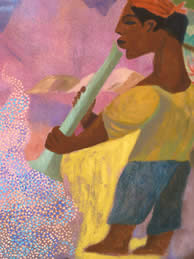
Click
to view entire painting
Details
of painting, purchasing and Mari Hall ~ Artist
The unprecedented achievement of Toussaint, Christophe, Dessalines
and the others has been devalued by historians who have seized
on the extravagances
of Christophe particularly to smear a glorious revolution. Since the revolution,
the history of Haiti – like the history of most of the Americas – has been
a history of war, violence, and exploitation financed and directed by foreigners,
mainly Americans.
It is hardly known here that at the height of the US' expansionist "Manifest
Destiny" period an attempt was made on Jamaica, after the 1907 earthquake.
The Americans at that time used all sorts of pretexts to intervene – humanitarian
reasons or to quell disorder or to restore financial stability or whatever.
In the case of Jamaica, the then governor, Alexander Swettenham, ordered
the express withdrawal of American warships and marines which had landed
in Kingston, so they said, to restore order.
Swettenham lost his
job, but those Jamaicans who were looking for an American godfather
had to wait another 90 years.
"If
we must die."
In an editorial a few
days ago, the Jamaica Observer said, inter alia that Caricom should
have "made it clear to the Haitian opposition that the bicentenary
celebrations of the achievement of black slaves was of monumental
importance to black people across the world and transcended the
immediate domestic politics. Mr. Mbeki of South Africa understood
this. Unfortunately, [Jamaican Prime Minister P. J.] Patterson
didn't."
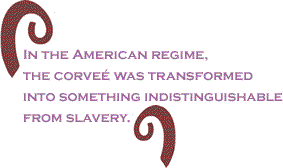
The artificial instabilities of the 19th century in Latin
America had their real genesis in the Monroe Doctrine,
which decreed
that countries in the
Americas, except those controlled by the European powers were subject
to US hegemony. George Canning, then Britain's foreign secretary,
chortled: "I
have called a New World into existence to redress the balance of the
Old."
France, the old colonial landlord of Haiti, had been so scared by
the success of the Haitian revolution that it sold off, for a pittance,
the Louisiana
territories to the United Sates, more than doubling the size of that
country.
But after Napoleon, France had second thoughts and finally managed, during
another period of Haitian instability, to extort an "agreement" that
condemned Haiti to pay a substantial annual indemnity to France for the success
of the revolution. This criminal burden was faithfully respected by the Haitians,
though it caused them no end of grief. With much of their revenue exported
to France, there was little left to develop Haiti. The Americans lent money
to "help" Haiti repay the French.
Finally, just like
today, the accumulated debt became impossible to pay and the
American marines stepped in.
The first US marine general, Caperton, was a diplomat. He
was able to set up a puppet regime of collaborators and secure
a "legal" basis
for the occupation in the Haitian-American Treaty of 1915. His successor,
General Littleton Waller, was different: "These people are niggers in
spite of the thin varnish of education and refinement. Down in their hearts
they are just the same happy, idle, irresponsible people we know of."
Not surprisingly, Waller's regime provoked resistance, led mainly by
a man called Charlemagne Peralte. The puppet government had been forced
to agree
to changing the constitution to allow foreigners to own land and American
capital poured in, destroying forests to plant coffee and citrus. The US
next introduced forced labor, under an old Haitian law which commanded the
people to give an occasional free day to build the country. In the American
regime, the corveé was transformed into something indistinguishable from
slavery.
Charlemagne Peralte was murdered by American troops. His people were bombed
and otherwise massacred.
Haiti was safe for
American democracy. One of those who made it so was American
Marine, General Smedley Butler, who, after he retired had second
thoughts:
"I helped make Mexico safe for American oil interests in 1914. I helped
make Haiti and Cuba a decent place for the National City Bank boys to collect
revenues in. I helped in the raping of half a dozen Central American republics
for the benefits of Wall Street. The record of racketeering is long."
General
Butler said: "I
suspected I was just part of a racket at the time. Now I am sure
of it. Like all the members of the military profession, I never
had a thought of my own until I left the service. My mental faculties
remained in suspended animation while I obeyed the orders of
higher-ups. This is typical in the military service." Butler
compared himself unfavorably to Al Capone. He said his official
racketeering made Capone look like an amateur.
Floating barracoons
in Kingston Harbor
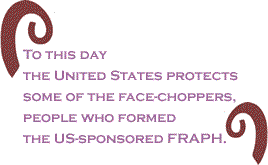
The
utter backwardness of the present government of Jamaica was
never better expressed
than in 1994, when, stooging for the Americans, it allowed
the mooring of American "floating barracoons" in
Kingston harbor. On these ships Haitians fleeing the successors
to Duvalier were "processed" – most of them sent
back to the country in which they were in danger of having
their "faces chopped off," according to no less than
President Clinton.
This unprincipled and barbarous betrayal of fellow human beings,
our brothers, made me want to vomit. It still does. Because
that stooging prepared the
way for what now happens in Haiti, where forces antagonistic to every principle
of the original revolution are determined, at long last, to make Haiti submit,
to tie her down for eternal rape – to use General Butler's word.
People will tell you that Haitians are the authors of their own misery. As
other people say, people who don't remember their history are doomed to repeat
it.
The dismemberment and strip mining of Haiti's economy, social, political
and intellectual life was under regimes tolerated or sponsored by the United
States. To this day the United States protects some of the face-choppers,
people who formed the US-sponsored FRAPH, supposedly a force to rebuild Haiti,
according to democratic free-market principles.
Today, elements of the same forces provide the opposition to President Aristide,
defecating on their own history with a little help from their friends.
"The Haiti Democracy Project was officially launched Tuesday, November 19,
2002 at the Brookings Institution in Washington, DC. The inauguration brought
together over 120 guests and participants from the Haitian-American community
along with members of the US academic and foreign-policy communities." This,
according to the Haiti
Democracy Project (HDP) website.
Even the assistant secretary general of the OAS,
Luigi Einaudi, was there: "Einaudi opened the talks with dire predictions
that Haiti was fast approaching a point where diplomatic means would no longer
contribute to solve the crisis. According to Einaudi, those concerned about
Haiti should at this time be gathering for a 'wake'." – (Source HDP.)
For an OAS official to take part in such a ceremony and say what he said,
seems to me to be grossly improper, at the very least.
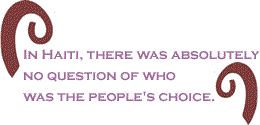
In June the HDP exhorted the OAS to disbar Haiti from membership and to intervene
to remove President Aristide from office.
HDP and others blame Aristide for everything that is wrong with Haiti. After
his re-election less than four years ago the multilateral agencies, at the
urging of the United States, withheld all aid from Haiti until they were
satisfied that Haiti had made itself into a democracy recognizable as such
by Americans. The pivot of this blackmail was the fact that there were irregularities
in the elections of a few senators, a fact of much slighter significance
than the irregularities in the election of President Bush. In Haiti,
there was absolutely no question of who was the people's choice.
In the case of Haiti these "irregularities" now assume
transcendental importance, and are cause for the world to condemn
Haiti to starve in obscene
misery. Without the money, Haiti's debt, incurred mainly by the Duvaliers,
cannot be serviced if the people of Haiti are to eat or go to school.
Without the money, thousands perish every year from HIV/AIDS and
starvation.
William Jennings Bryan, secretary of state to US President Woodrow Wilson,
eighty years ago expressed the contempt in which the Haitians are held by
the Anglo-Saxon power structure:
"Imagine!" Bryan said, "Niggers speaking French!!!"
Perhaps it would be
to our mutual advantage if Mr. Patterson might learn either French
or Creole, like the Haitian revolutionary hero, Bouckman, who
was a Jamaican.
John Maxwell of
the University of the West Indies (UWI) is the veteran Jamaican
journalist who in 1999 single-handedly thwarted the Jamaican government's
efforts to build houses at Hope, the nation's oldest and best known
botanical gardens. His campaigning earned him first prize in the
2000 Sandals Resort's annual Environmental Journalism Competition,
the region's richest journalism prize. He is also the author of
How to Make Our Own News: A Primer for Environmentalists and Journalists.
Jamaica, 2000. Mr. Maxwell can be reached at [email protected]
Copyright ©2004
John Maxwell
































